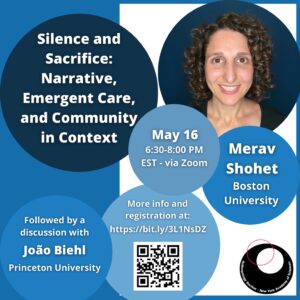NYAS Lecture May 16th: Silence and Sacrifice: Narrative, Emergent Care, and Community in Context

General
What are the contours and meanings of sacrifice and care in troubled times? In this talk, I explore both the affordances and violence involved in acts of care and sacrifice among multi-generational families who survived war, illness, and massive political and economic upheavals in Vietnam. Highlighting the role of silence in experiences of suffering in everyday and troubled lives, I examine how family members narratively navigate conflicting commitments to those whom they are expected to love while affirming or contesting local versions of justice. Through a close analysis of stories and video-recorded interactions of care for the dying, I challenge the prevailing anthropological idea that sacrifice is solely a blood-filled religious ritual or patriotic act. Women’s and children’s routine sacrifices, I show, precariously knit kin together by silencing their suffering and reifying cross-cutting gender, age, class, and political hierarchies. These invite us to reflect on how the ordinary ethic of sacrifice help family members forge a sense of continuity in the face of trauma and decades of turbulence and change.
Featured Speaker
Merav Shohet is Assistant Professor of Anthropology at Boston University. Her work integrates psychological-medical and linguistic anthropology to examine care, affect, ethics, and gender in relation to kinship, narrative, eating disorders, and the end of life in Vietnam and North America. She is the author of Silence and Sacrifice: Family Stories of Care and the Limits of Love in Vietnam (University of California Press 2021), and she has published articles on related topics in American Anthropologist, American Ethnologist, Ethos, Transcultural Psychiatry, and the Journal of the Royal Anthropological Institute, among others. Two of her current projects include an SSRC-funded study of stigma syndemics and end-stage kidney disease in disenfranchised Boston area communities fighting Covid-19 and a longitudinal study of practices of elder-care and inequality in Israel’s transforming kibbutzim.
Discussant
In his ethnographic and historical work, João Biehl explores how people’s plasticity and environmental attunements disrupt and exceed dominant ways of knowing and acting, thus opening new vistas for storytelling and critical theory. As he dissects past and current regimes of power/knowledge, Biehl considers the array of human-nonhuman alignments, affects, ideas, technologies, and forces that shape survival in contexts of stark inequality and living together in frontier zones. In attending to insurgent archivings and advancing an anthropology of becomings, Biehl’s work seeks to restore a sense of wonder and movement to ethical and political debates and to creative expression.